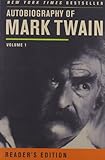 |
| Tom Denardo |
Today's encore selection -- from Autobiography of Mark Twain: Volume 1 by
Mark Twain. Samuel Clemens attempted to write his autobiography over
several decades but never finished, and instructed that the draft not be
made available for 100 years. In recently released manuscripts, Clemens
wrote of his early schoolboy friendships with black slaves, including
characters that appeared later in his most famous fictional works:
"All
the negroes were friends of ours, and with those of our own age we were
in effect comrades. I say in effect, using the phrase as a
modification. We were comrades, and yet not comrades; color and
condition interposed a subtle line which both parties were
conscious of,
and which rendered complete fusion impossible. We had a faithful and
affectionate good friend, ally and adviser in 'Uncle Dan'l,' a
middle-aged slave whose head was the best one in the negro-quarter,
whose sympathies were wide and warm, and whose heart was honest and
simple and knew no guile. He has served me well, these many, many years.
I have not seen him for more than half a century, and yet spiritually I
have had his welcome company a good part of that time, and have staged
him in books under his own name and as 'Jim,' and carted him all around
-- to Hannibal, down the Mississippi on a raft, and even across the
Desert of Sahara in a balloon -- and he has endured it all with the
patience and friendliness and loyalty which were his birthright. It was
on the farm that I got my strong liking for his race and my appreciation
of certain of its fine qualities. This feeling and this estimate have
stood the test of sixty years and more and have suffered no impairment.
The black face is as welcome to me now as it was then.
"In my schoolboy days I had
no aversion to slavery. I was not aware that there was anything wrong
about it. No one arraigned it in my hearing; the local papers said
nothing against it; the local pulpit taught us that God approved it,
that it was a holy thing, and that the doubter need only look in the
Bible if he wished to settle his mind --and then the texts were read
aloud to us to make the matter sure; if the slaves themselves had an
aversion to slavery they were wise and said nothing. In Hannibal we
seldom saw a slave misused; on the farm, never.
 |
| Jane Lampton Clemens |
"There was, however, one
small incident of my boyhood days which touched this matter, and it must
have meant a good deal to me or it would not have stayed in my memory,
clear and sharp, vivid and shadowless, all these slow-drifting years. We
had a little slave boy whom we had hired from some one, there in
Hannibal. He was from the Eastern Shore of Maryland, and had been
brought away from his family and his friends, half way across the
American continent, and sold. He was a cheery spirit, innocent and
gentle, and the noisiest creature that ever was, perhaps. All day long
he was singing, whistling, yelling, whooping, laughing -- it was
maddening, devastating, unendurable. At last, one day, I lost all my
temper, and went raging to my mother, and said Sandy had been singing
for an hour without a single break, and I couldn't stand it,
and wouldn't she please shut him up. The tears came into her eyes, and
her lip trembled, and she said something like this --
'Poor thing, when he sings, it shows that
he is not remembering, and that comforts me; but when he is still, I am
afraid he is thinking, and I cannot bear it. He will never see his
mother again; if he can sing, I must not hinder it, but be thankful for
it. If you were older, you would understand me; then that friendless
child's noise would make you glad.'
 |
| Samuel Clemens and John T. Lewis (one of the possible models for Jim in Huckleberry Finn) |
"It was a simple speech,
and made up of small words, but it went home, and Sandy's noise was not a
trouble to me any more. She never used large words, but she had a
natural gift for making small ones do effective work. She lived to reach
the neighborhood of ninety years, and was capable with her tongue to
the last -- especially when a meanness or an injustice roused her
spirit. She has come handy to me several times in my books, where she
figures as Tom Sawyer's 'Aunt Polly.' I fitted her out with a dialect,
and tried to think up other improvements for her, but did not find any. I
used Sandy once, also; it was in 'Tom Sawyer;' I tried to get him to
whitewash the fence, but it did not work. I do not remember what name I
called him by in the book."
 Autobiography of Mark Twain: Volume 1, Reader's Edition (Mark Twain Papers)
Autobiography of Mark Twain: Volume 1, Reader's Edition (Mark Twain Papers)
Author: Mark Twain
Publisher: University of California Press
Copyright 2010, 2001 by the Mark Twain Foundation
Pages 211-212
No comments:
Post a Comment